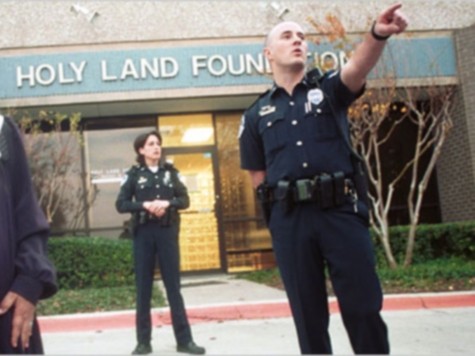Monday, the Supreme Court denied an appeal of the conviction of five leaders of the Holy Land Foundation for Relief and Development (HLF), a Muslim organization that funneled funds to Hamas, recognized by the United States as a terrorist organization. Three of the men who had been convicted were Shukri Abu Baker, Mohammad El-Mezain, and Ghassan Elashi, who incorporated HLF, and two other men, Mufid Abdulqader and Abdulrahman Odeh worked for HLF as fundraisers.
The original conviction occurred in 2008. Baker was sentenced to a total of 65 years in prison; Elashi, the same; Abdulqader, 20 years; El-Mezain 15 years, and Odeh, 15 years.
HLF, now defunct, was convicted on 10 counts of conspiracy to provide, and the provision of, material support to a designated foreign terrorist organization; 11 counts of conspiracy to provide, and the provision of, funds, goods and services to a Specially Designated Terrorist; and 10 counts of conspiracy to commit, and the commission of, money laundering.
The Court agreed with the jury on the money judgment, HLF had to pay $12.4 million, which was the exact amount of money HLF had funneled to Hamas.
According to the Department of Justice:
From its inception, HLF existed to support Hamas. Before HLF was designed as a Specially Designated Terrorist by the Treasury Department and shut down in December 2001, it was the largest U.S. Muslim charity. It was based in Richardson, Texas, a Dallas suburb. The “material support statute,” as it is commonly referred to, was enacted in 1996 as part of the Antiterrorism and Effective Death Penalty Act. That statute recognizes that money is fungible, and that money in the hands of a terrorist organization — even if for so called charitable purposes — supports that organization’s overall terrorist objectives.
The government presented evidence at trial that, as the U.S. began to scrutinize individuals and entities in the U.S. who were raising funds for terrorist groups in the mid-1990s, the HLF intentionally hid its financial support for Hamas behind the guise of charitable donations. HLF and these five defendants provided approximately $12.4 million in support to Hamas and its goal of creating an Islamic Palestinian state by eliminating the State of Israel through violent jihad.
The government’s case included testimony that in the early 1990’s, Hamas’ parent organization, the Muslim Brotherhood, planned to establish a network of organizations in the U.S. to spread a militant Islamist message and raise money for Hamas. The government’s case also included testimony about Hamas material found in zakat committees. The defendants sent HLF-raised funds to Hamas-controlled zakat committees and charitable societies in the West Bank and Gaza. Zakat is an Arabic word referring to the religious obligation to give alms.
HLF became the chief fundraising arm for the Palestine Committee in the U.S. created by the Muslim Brotherhood to support Hamas. According to a wiretap of a 1993 Palestine Committee meeting in Philadelphia, former HLF President and CEO Shukri Abu Baker, spoke about playing down their Hamas ties in order to keep raising money in the U.S. Another wiretapped phone call included Abdulrahman Odeh, HLF’s New Jersey representative, referring to a suicide bombing as “a beautiful operation.”
During trial, the government also presented evidence that HLF was so concerned about investigators uncovering the group’s intentions that they kept a manual entitled “The Foundation’s Policies and Procedures.” HLF followed various security procedures outlined in the manual to include hiring a security company to search the HLF for listening devices, ordering defendant Haitham Maghawri, a fugitive, to take training on advanced methods in detecting wiretaps, shredding documents after board meetings, and maintaining incriminating documents in off-site locations.
With plenty of evidence that the Obama Administration has welcomed supporters of terrorism into its good graces, it is imperative that the insidious nature of Islamist infiltration in the United States be stopped. Even the recitation of the Constitution has come under attack from CAIR, the Council on American-Islamic Relations. By its decision Monday, the Supreme Court may have helped start a movement to protect Americans from terrorism-supporters in their midst.

COMMENTS
Please let us know if you're having issues with commenting.